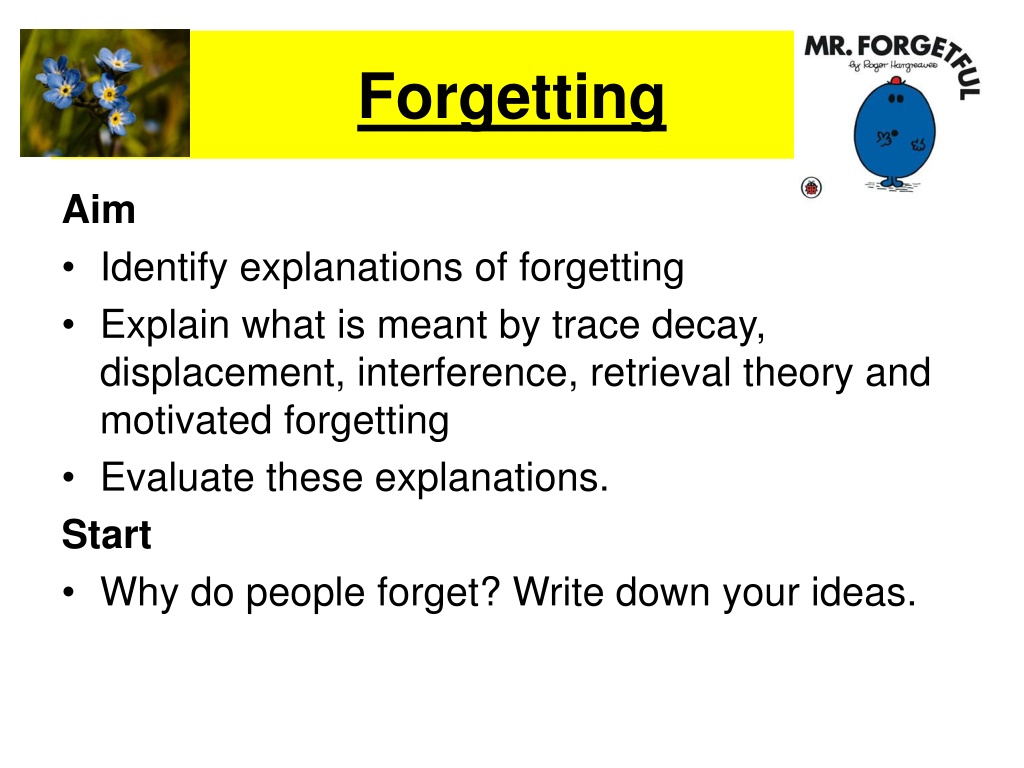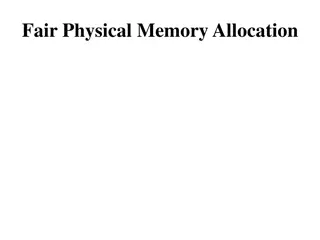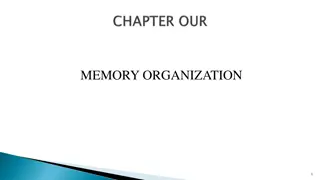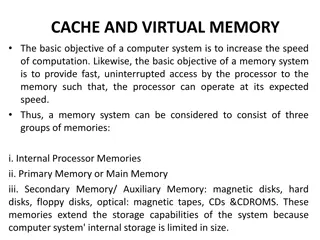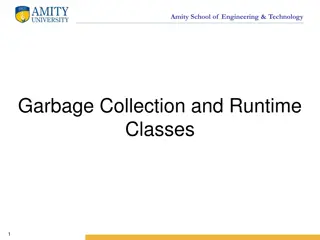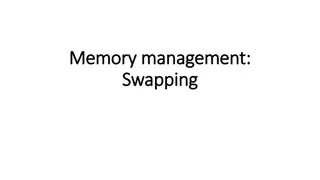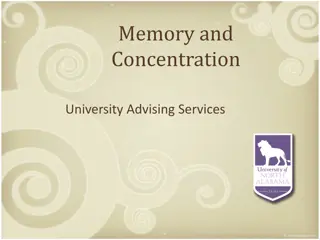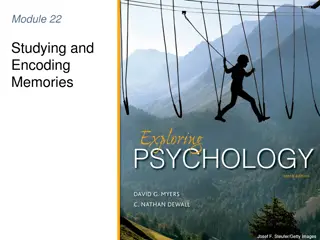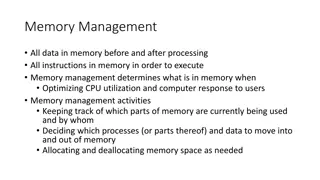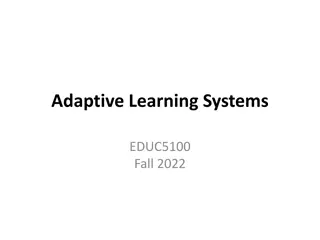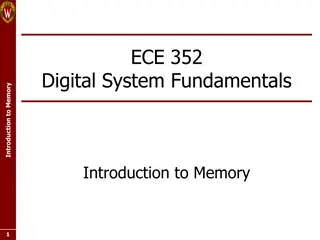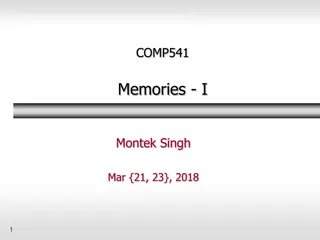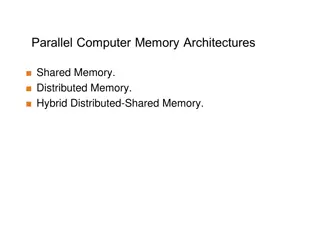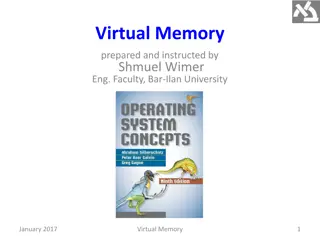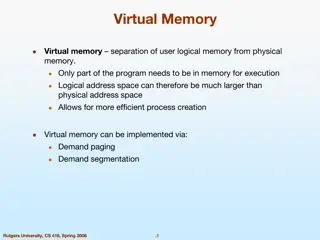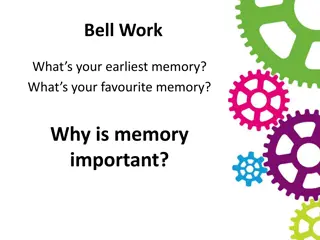Exploring Explanations of Forgetting in Memory
This content delves into various explanations of forgetting in memory, such as trace decay, displacement, interference, retrieval theory, and motivated forgetting. It discusses why people forget and evaluates these theories. Additionally, it explores the Multi Store Model of Memory and concepts like the Serial Position Effect. Various theories are analyzed, such as trace decay suggesting memories fade over time, displacement indicating new information pushes out old, interference disrupting memory retrieval, and motivated forgetting where memories are purposely suppressed.
Download Presentation

Please find below an Image/Link to download the presentation.
The content on the website is provided AS IS for your information and personal use only. It may not be sold, licensed, or shared on other websites without obtaining consent from the author. Download presentation by click this link. If you encounter any issues during the download, it is possible that the publisher has removed the file from their server.
E N D
Presentation Transcript
Forgetting Aim Identify explanations of forgetting Explain what is meant by trace decay, displacement, interference, retrieval theory and motivated forgetting Evaluate these explanations. Start Why do people forget? Write down your ideas.
The The Multistore Multistore model of memory states that LTM has an unlimited capacity, model of memory states that LTM has an unlimited capacity, and memories have a duration of potentially a lifetime. and memories have a duration of potentially a lifetime. However, we know by experience that we forget information stored in the However, we know by experience that we forget information stored in the LTM. LTM. But does that mean the memories are gone ( But does that mean the memories are gone (availability reach them ( reach them (accessibility accessibility) ? ) ? availability), or we just can t ), or we just can t www.psychbug.co.uk
Forgetting The inability to recall or recognise something that was previously learned. http://t0.gstatic.com/images?q=tbn:ANd9GcQMqtaW2o3Ev9zv2oFPYUeDtydy7C8r-WodSWUmPZ19y2pVNJ30Qtkh4gSv Have a go at trace decay experiment. www.psychlotron.org.uk
Which theory best explains the Serial Position Effect? Does not explain why earliest material is remembered better (Primacy Effect) than the material in the middle which came latter. Explains why material is lost from middle and why less is lost from the end (Recency Effect) but it does not explain the primacy effect. Offers best explanation, material in middle of curve is subject to both Pro- active & Retro-active interference, but the material at start and end of the list only one of these. TRACE DECAY? DISPLACEM ENT? INTERFERE NCE? Serial Position Curve Primacy Effect Recency Effect Retro-active Interference Pro-active Interference only only Both Pro-active & Retro-active Interference Can you think of examples from LTM when this may not be the case?
Create a table Explanations of forgetting: Theory Description Evidence Evaluation
What are the main features of the Multi Store Model of Memory
Trace Decay (STM) www.psychlotron.org.uk
TRACE DECAY The simple idea that memories are lost over time is called First proposed by Hans Ebbinghaus in 1885 based on testing his own memory for non-sense syllables (such as BEJ, ZUX) which had no associations. Ebbinghaus found that his memory decayed over time, called the FORGETTING CURVE . RECALL % TIME = DAYS This is NOT an adequate explanation for forgetting in LTM because - Items which cannot be remembered at one time can be recalled later. Older meaningful memories of important events can often be remembered better than newer but less relevant ones.
Distractor task practice count back in three s from 333. Trace Decay in STM? Student Exercise MemEx1 Instructions:- Read the consonants that appear below then count backwards in three s from the number given. Write down the letters you recall when asked. L Z M , P V Q, X F D B F Y , G Z J, P D L K M R , H G Y, J T Z M Q L , T L Y, F R N 763 435 917 329 STOP! WRITE NOW! STOP! WRITE NOW! STOP! WRITE NOW! STOP! WRITE NOW! This shows that the longer the interval before recall the more items that are lost from memory. This is what we would expect because Peterson & Peterson showed that the duration of S.T.M. is between 18 30 secs.
Trace Decay (STM) Trace decay Based on the idea that information is physically represented as a memory trace (i.e. arrangement of neurons structural change in the brain. The trace is fragile and disintegrates if not constantly refreshed In STM after about 20s, the trace has decayed completely & recall is no longer possible
Trace Decay: Evidence Peterson & Peterson (1959) Recall of trigrams after varying intervals Interference task to prevent rehearsal Found less that 10% recall after 18s Claimed evidence for decay in STM Difficult to test trace decay as participants will automatically rehearse. Forgetting may be due to interference rather than decay (Waugh & Norman, 1985) www.psychlotron.org.uk
Displacement (STM) Short Term Memory www.psychlotron.org.uk
Is the simple idea that new memories will replace old ones DISPLACEMENT This theory assumes that a memory store has a limited capacity, so which types of memory will it apply to? Miller (1956) found that when STM was full up (5 9 items) new material would push out the old. NEW INFORMATION INPUT OTHER INFORMATION IS LOST S.T.M. 7+-2 items Evidence from the digit span tests! Also Sperling (1960) found that SENSORY MEMORY also has a very limited capacity so this theory would also explain forgetting here but- This is NOT an adequate explanation for forgetting in LTM because - As far as we can tell LTM has an unlimited capacity. We can recover memories that we thought were forgotten.
Displacement Displacement Based on the idea that STM has a strictly limited capacity for information If STM is full and new information is registered, then some existing info is pushed out or overwritten. Good description of forgetting in STM when applied to the MSM model. Digit-span evidence. Does not account for WMM Is STM more complex than a limited capacity store. www.psychlotron.org.uk
Forgetting: interference Interference: one memory disturbs the ability to recall another. This might result in forgetting or distorting one or the other or both. This is more likely to happen if the memories are similar. Proactive interference: Previously learnt information interferes with the new information you are trying to store. Retroactive interference: A new memory interferes with older ones. New memory Old memory Old memory New memory Proactive interference Pro=forward Retroactive interference Retro=backward www.psychbug.co.uk
Interference (mainly LTM) What happens in between learning and recall Proactive Previous learning interferes with what is being learnt Retroactive later learning disrupts memory of earlier learning e.g. Change location of cutlery in kitchen, but keep going to the old drawer e.g. Learning French then later Spanish The Spanish can disrupt the knowledge of the French Old phone number interferes with new phone number New phone number interferes with old phone number.
Proactive interference This is when previous learning interferes with later learning. (When an older memory interferes with a new one). E.g. When you rearrange the location of items in a room, and you keep going back to the place where the items used to be instead of where they are now. www.psychbug.co.uk
Retroactive interference This is when later learning disrupts earlier learning. (When a newer memory interferes with an older one). E.g. new facts about WMM could alter what you know about the MSM www.psychbug.co.uk
Proactive or retroactive ? Imagine you have learned to drive a car in the UK (You have learned to drive on the left side of the road). You then fly to Spain and hire a car. Driving out of the airport, you narrowly avoid causing an accident because you failed to drive on the right. What type of intereference caused this? www.psychbug.co.uk
Answer: Proactive interference: Your old memory of driving on the left interfered with the later learning of driving on the right. You return to the UK and driving out of the car park, you find yourself in the right hand lane. This is another type of interference. Which? www.psychbug.co.uk
Answer: Retroactive interference: the new (recent) memory of driving on the right in Spain has interfered with your earlier, original learning of driving on the left. www.psychbug.co.uk
Retroactive Interference Underwood & Postman (1960) Learn word pairs Set A Dog- Balloon Carrot Fence Moon Chair Baby Market Parcel Lamp Wine - Pencil River Cheese Hammer - Football
Retroactive Interference Learn word pairs Learn word pairs Set B Dog- Paper Carrot- Milk Moon- Ankle Baby- Petal Parcel-Tent Wine - Dog River Book Hammer - Plastic Set A Dog- Balloon Carrot Fence Moon Chair Baby Market Parcel Lamp Wine - Pencil River Cheese Hammer - Football
Retroactive Interference Learn word pairs Learn word pairs Set B Dog- Paper Carrot- Milk Moon- Ankle Baby- Petal Parcel-Tent Wine - Dog River Book Hammer - Plastic Set A Dog- Balloon Carrot Fence Moon Chair Baby Market Parcel Lamp Wine - Pencil River Cheese Hammer - Football
Interference - Warr When list A interferes with list B recall. Proactive When list B interferes with list A recall. Retroactive
Underwood & Postman(1960) Aim: to find out if new learning interferes with previous learning. Procedure: Participants were divided into two groups. Group A were asked to learn a list of word pairs i.e. cat- tree, they were then asked to learn a second list of word pairs where the second paired word was different i.e. cat glass. Group B were asked to learn the first list of word pairs only. Both groups were asked to recall the first list of word pairs. Results: Group B recall of the first list was more accurate than the recall of group A. Conclusion: This suggests that learning items in the second list interfered with participants ability to recall the list. This is an example of retroactive interference. www.psychbug.co.uk
Schmidt et al (2000) Remembering streets of childhood. How is this a study of RETROACTIVE interference? Pg. 77
A real life study: Baddelley & Hitch (1977) Rugby players study. They had to remember the names of the teams they had played. The more teams they played the poorer the recall as new teams interfered with memory of old ones. (retroactive interference)
Abel & Baum (2013) Pps given a list of word-pairs to remember and a second list of similar word-pairs. Tested after 12 hours sleep or wakefulness. Sleep reduced both retroactive and proactive interference.
INTERFERENCE PROACTIVE RETROACTIVE For example you are learning Spanish this year, last year you leant French. Where information learnt earlier interferes with that learnt later. Where information learnt later interferes with that learnt first. Qu. What is it if John calls his current girlfriend by the name of his ex?
Evaluation of Interference Support from lots of laboratory studies. Studies lack ecological validity Good explanation of forgetting in LTM. Semantic or episodic memories are more resistant to interference Does concept explain all types of forgetting or just a very specific circumstances when two sets of information are similar.
Apply it: Outline the interference theory of forgetting, referring to Caleb s experience in your answer. ( 4 marks) Caleb saw a film about Zombies a while ago, and went to see a different one recently. A friend, Ashton, asked him some questions about the first film but Caleb found he had trouble recalling the details accurately. A second friend, Anais then joined in and wanted to know about the recent film Caleb went to see. But again, Caleb seemed to forget some parts. www.psychbug.co.uk
Caleb had difficulty remembering details of the first film when Ashton asked him due to retroactive interference. This is because he had seen a newer film afterwards and this new memory had interefered with the memory of the original film. He had difficulty remembering the newer film when Anais asked due to proactive interference. This was www.psychbug.co.uk
Exam question Explain how proactive interference differs from retroactive interference ( 3 marks) www.psychbug.co.uk
Multiple choice Proactive interference occurs when: (a) Newer memories cause forgetting of older ones (b) Memories fade over time (c.) Older memories cause forgetting of newer ones (d) We don t have the right information to trigger out memory. www.psychbug.co.uk
Answer: C www.psychbug.co.uk
Multiple choice Which of the following examples is the best example of retroactive interference? A) A student revises for her Spanish exam, then her French exam and has trouble recalling her Spanish B) A student revises for her Spanish exam, then her French exam and has trouble recalling her French C) You have anew mobile number but keep telling people your old one D) You accidentally call your new boyfriend or girlfriend by your old one s name www.psychbug.co.uk
Answer A www.psychbug.co.uk
To Start Tip of the Tongue Have you ever experienced tip of the tongue phenomenon? Or come down the stairs to get something only to completely forget what it was once you get down... Annoying isn t it? Why do you think it happens?
Cue Dependent Experiment You will see a number of things on the screen. In each case, write down the first thing you think of/remember
Cue Dependent http://the-collectiveonline.com/wp-content/uploads/2013/07/heidi_klum_barbie_doll_sequin.jpg http://www.actionmanhq.co.uk/actionman2/aquablaster.jpg
Cue Dependent The Smell of http://images-its.chemistdirect.co.uk/Bonjela-Gel-Original-3008.jpg?o=9Xcu9OCh9zouX6pH0qBFXSYFD@cjV=bsoyq=70
Cue Dependent http://twinsmummy.files.wordpress.com/2011/02/calpol.jpg The taste of
Cue Dependent http://glasgowyp.co.uk/wp-content/uploads/2012/04/Rubiks_cube_by_keqs.jpg
Cue Dependent http://www.totalmerchandise.co.uk/uploads/product-images/Total_Merchandise_Promotional_Bucket_And_Spade_Personalised_Logo_Design_11.jpg
Cue Dependent Why might these objects help us to recall our memories?
Cue Dependent Retrieval failure Forgetting, Tulving (1972) This is when we cannot access the memory until the correct retrieval cue is used. When we encode a new memory we also store information that occurred around it, such as the way we felt or the place we were in. If we cannot remember or recall it, it could be because we are not in a similar situation to when the memory was originally stored. Encoding Specificity Principle (Tulving) = the greater the similarity between the encoding event and the retrieval event, the greater the likelihood of recalling the original memory.
Cue Dependent There are two types of cue dependent forgetting Context What could each of these mean? State
If information has been encoded and stored successfully in LTM but still cannot be remembered then this could be due to Cue Dependant Forgetting Tip of the Tongue is a common experience when we simply need the right clue (or Cue) to help us recall something. The cue usually relates to the conditions of encoding, in semantic memory it often organisational eg: categories. State Dependant forgetting Is when your internal state, mood or condition at the time of encoding information provides a cue to remembering it. Context Dependant forgetting Is when the external environmental factors at the time of encoding information provides a cue to remembering it. WORDS WORDS WORKS
